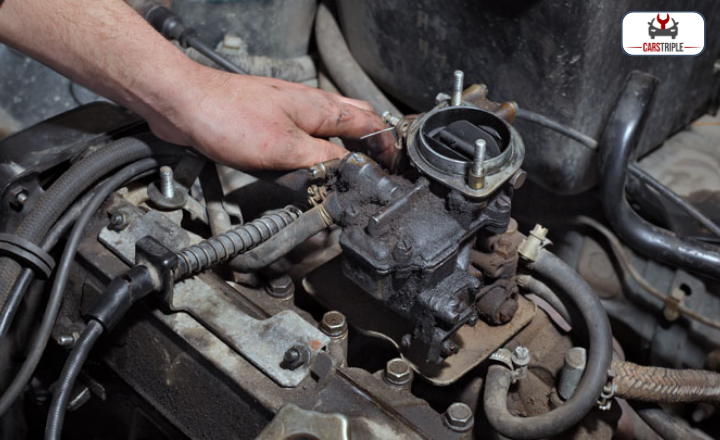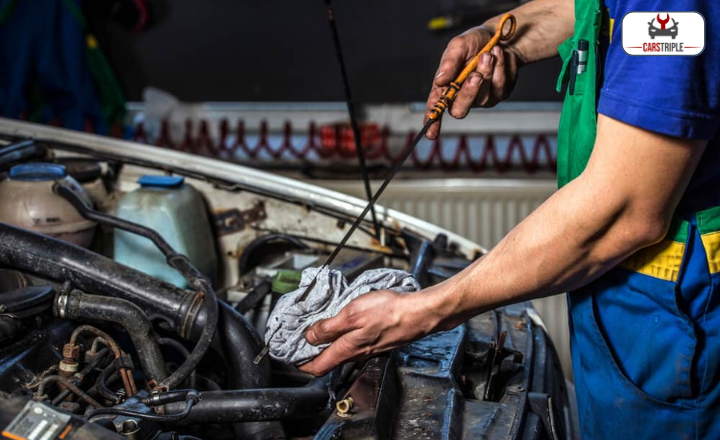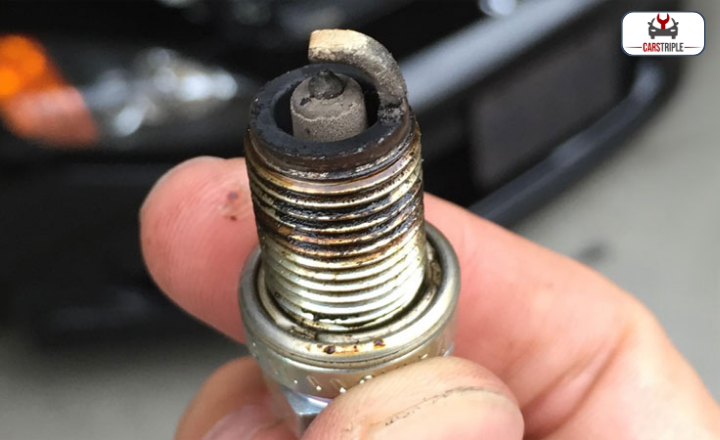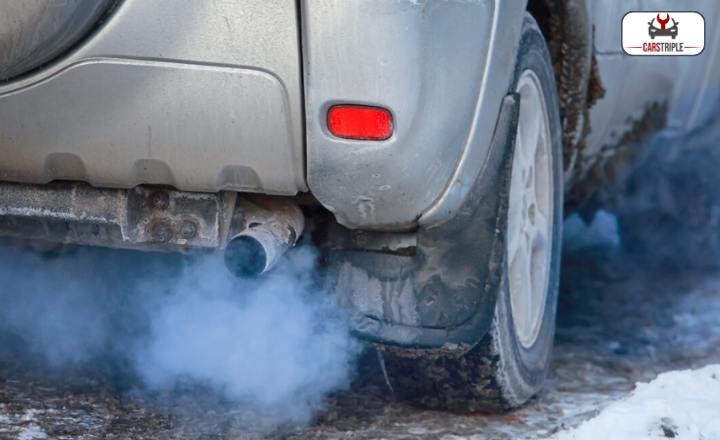Valve seals prevent oil leakage into cylinders, keeping it in the crankcase. Here’s how to spot bad valve seals. Cars have multiple parts; some will wear out and need replacing. The engine experiences the most wear due to heat and pressure, which can damage parts like valve seals over time.
These seals are crucial in keeping engine oil and pressure separate. Although faulty valve seals are uncommon in modern vehicles, they do happen. We know car upkeep expenses can be scary, but don’t worry. Let’s look at our comprehensive guide, Valve Seals Replacement Cost. We’re here to explain everything clearly.
What Are The 6 Symptoms Of Bad Valve Seals?
Blue smoke from your car’s exhaust could signal trouble with the valve seals. This smoke happens when the engine burns oil, often a sign of worn or damaged valve seals. An alert calls for quick action to prevent significant harm or costly fixes. But there’s more to look for.
You might see oil on your spark plugs when you check under the hood! Over time, this can cause your engine to run rough and mess up smooth driving. Also, watch out for oil leaks outside the engine and poorer fuel efficiency; these could mean you need new valve seals. These signs alone might not confirm bad valve seals, but they hint it’s time to look after those crucial parts that keep our cars going!
Here’s a simplified, all-inclusive list of indications that your valve seal could be faulty or about to fail:
Acceleration loss
A car that doesn’t perform well might have oil blocking its vital parts because of faulty valve seals. Burned oil can harm your car’s valves, spark plugs, and catalytic converter. You might not know it, but your catalytic converter could be in serious trouble if you’re dealing with this issue.
This device that controls emissions cuts down harmful pollutants in exhaust gas. But when it’s clogged by the leftover burned oil from bad valve seals, it can’t let these gases out smoothly and can significantly reduce your vehicle’s performance.
A rough idle

Your car is like a mystery book that reveals its secrets when idle. It can show hidden problems, such as a damaged valve seal. A steady RPM from an idling engine can become uneven if faulty valve seals let oil into the combustion chamber. This could make your car shake at a traffic stop or cause you to have trouble starting up – signs that something might be wrong under the hood.
Bad intake valve seals can also mess with your spark plugs, causing them to fill up with oil and worsen things. You might see hard idling and blue smoke, signs of rotten valve seals. Car lovers or regular people must understand what’s happening inside our cars. This helps us keep them running smoothly and fix any problems quickly before they become more prominent.
Leaks of external oil
Turbo cars are fast and exciting, but many people need to remember the small parts, like intake valve seals. They usually focus on the more significant, more powerful features like turbos and intercoolers. But, ignoring these small seals when they get old can cause substantial issues.

These little parts can start to fail and let turbo pressure go into places it shouldn’t. This makes the pressure inside the engine’s housing go up. And that’s a big problem because it starts with other issues, too. Seals in the machine that generally stay put have to deal with harsh conditions and might come out of place. This can cause oil leaks outside of the engine. It’s almost like your car’s engine is at war!
Use of poor-quality oil
Car problems can arise from leaky engine oil due to poor valve seals. Sadly, many car owners overlook this issue. Let’s simplify this: imagine your car’s oil tank containing 4 litres. A leak means the oil will gradually drain as you drive. Not having enough oil leads to excessive friction between the engine parts, causing significant damage or even a total engine failure.
Checking excessive oil consumption isn’t tricky – monitor the levels using your car’s dipstick. Notice a fast or slow drop in rank over time? Get a mechanic on it immediately. Ignoring these signs could cost you dearly in repairs or even require an entire engine replacement.
Spark plugs with oil buildup

Don’t worry when you see weird, clay-like stuff on the ends of your newly replaced spark plugs. It’s likely due to oil residue from the engine burning fuel. This could mean a more significant issue with your car – it’s not just about dirty spark plugs. A damaged turbocharger or a broken intake valve seal can let oil into your engine cylinder. This usually causes an odd type of clay to form.
These problems aren’t minor and can cause significant damage over time, potentially wrecking your engine performance or even causing it to stop working. Stay alert and take action because spotting this small amount of clay could prevent costly car repairs in the future.
Blue emission smoke
Blue smoke from your car’s exhaust pipe is a big red flag that needs quick action. This often happens due to a damaged valve seal in the engine. The bad seal steals engine oil and sends it to the combustion chamber, which should not occur. Consequently, burning oil there results in blue smoke exiting your exhaust pipe. But it doesn’t stop there.

Sometimes, the exhaust valve seal itself can leak. This allows oil vapour to escape directly into your exhaust pipe, worsening the blue smoke issue. You’ll spot this, especially when zooming down highways or city streets, as the blue smoke becomes more visible. Keep an eye on these signs and tackle them before they become enormous obstacles for your trip.
The Function Of A Valve Seal
A valve seal’s primary function is to prevent oil leakage into the engine. It is a barrier between the intake and exhaust ports, ensuring that oil doesn’t mix with the fuel-air mixture or exhaust gases. This is essential for maintaining proper engine lubrication and preventing excessive oil consumption, which could lead to other mechanical issues.
Valve seals are typically made from high heat-resistant rubber materials and include a metallic outer ring for added durability. They are designed to withstand the intense temperatures and pressures within an engine’s combustion chamber. Valve seals in today’s engines usually last a long time and work well. But sometimes they can break because they get old or are used in harsh conditions. This can cause oil to leak, the engine to not work as well, and more pollution to be released.
Valve Seal Location
Valve seals are essential to your engine’s overall health and functionality. They are located in the cylinder head, specifically underneath the valve springs. These seals play a critical role in controlling the oil that lubricates the valve stems as they move up and down.
You will typically need to remove the valve cover to locate these seals, as they are not easily visible or accessible from the outside. Once you’ve removed this cover, you’ll find them beneath the valve springs. You need to know a lot and have the right tools to work on engine parts because it can be tricky. Make sure you can do it yourself before you start. Otherwise, it’s smart to get help from a professional mechanic.
Valve Seals Replacement Cost
The cost of replacing a valve seal largely depends on the make and model of your vehicle, as well as local labour costs. The actual valve seals are inexpensive, typically between $50 to $100. The work needed to change them can significantly bump up the total price. You could be looking at anything between $200 and $2,000.
To replace the valve seals, mechanics must remove the valve cover and springs. You can remove these by increasing pressure in the cylinder chamber without fully taking apart the cylinder head. But, there are times when you need to completely disassemble it. This can add to the labour time and subsequently increase costs. Therefore, depending on these factors, you could look at a total cost of between $250 and $2,100 for a valve seal replacement.
Can You Do It Yourself?
You can replace valve seals independently if you have the necessary skills, tools, and time. Remember, this is a challenging job. You need to know your way around car mechanics. Doing it wrong could seriously harm your engine.
Before you fix it, research and maybe watch some how-to videos or tutorials for a clear step-by-step guide. Talking to a pro mechanic or someone who knows about car fixes can be helpful, too. The price of valve seals might be low, but fixing errors made during the replacement could cost a lot more.
Conclusion
The Valve Seals Replacement Cost guide sums up that the price to replace valve seals can change a lot. Things that affect the price include what kind of car you have, where you live, and how much mechanics charge. Valve seals are essential for your car’s engine to work well and use fuel efficiently. If you put off replacing them, it could cost more later on. That’s why car owners must act fast when they see a problem. Always ask a mechanic you trust for an exact cost estimate. Remember, spending money on keeping your car in good shape now can help avoid big bills and problems later on.
FAQ’s
Will replacing my valve seals improve fuel efficiency?
Yes, replacing worn-out valve seals can improve fuel efficiency because they prevent excess oil from entering the combustion chamber which can cause inefficient burning of fuel.
How long does it take to replace valve seals?
The process usually takes between 5-8 hours depending on the complexity of the repair and the make and model of your vehicle.
Read More:
